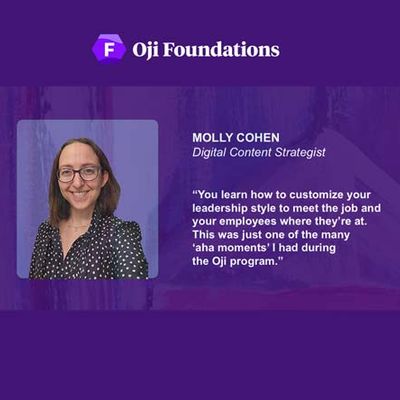Why New Managers Fail and How Oji Foundations is Revitalizing Leadership Training

The pattern is all-too-familiar: a talented individual contributor is promoted to be a first-time manager.
They start their new role brimming with excitement, only to realize in a moment of panic soon after that they fundamentally lack the skills needed to do the job. Though they thought they knew the job inside out – after all, they watched someone else do it for years – they quickly come to understand…
- They don’t know where their job ends and where their teammates’ jobs begin
- Their go-to technical skills aren’t applicable to the tasks at hand, tasks that require soft skills (that they don’t have)
- They can issue orders but don’t know how to use soft influence to direct their team
- They don’t know how to build appropriate boss-contributor relationships
What does this lead to?
An unhappy team. Frustration. Low engagement. Lagging productivity. Departures for other teams or companies.
According to Gartner, 67% of U.S. employees are disengaged at work, and roughly 70% of the variance in employee engagement depends on the manager. The productivity loss that happens as a result is immense, estimated to be $960 billion.
Linda Hill, Harvard Business School professor and best-selling author of Being the Boss shares, “In my research, I’ve seen how strong individual contributors are often promoted to management roles with little or no leadership training, with a ‘sink or swim’ philosophy. It’s no surprise that these untrained leaders often struggle in many areas, dragging their teams down with them in the process.”
Our newly released Oji Leadership Poll, conducted by Harris Research, shows that 4 in 10 employees felt “stress or anxiety about going to work” due to a first-time manager, over 33 percent lacked motivation, and 1 in 5 had trouble sleeping.

Many firms don’t offer new managers any formal training. And those that do typically offer low-cost/low-value video learning paths or brief workshops that are akin to reading a book on chess and expecting to start winning tournaments.
It’s not that these programs cover the wrong topics; often, they do. But they suffer from two profound flaws. First, they are rarely based on cutting-edge, research-tested systems of thought. Instead, they present reheated business anecdotes and theoretical academic papers that don’t translate to real-world excellence. Even if you could integrate this learning into your behavior, it wouldn’t take you to the next level of performance.
Second, and most importantly, these programs conceive of their mission as one of knowledge transfer, as if a manager with the right information would do the right things. The trouble is, as is the case in most types of workplace learning, people don’t need information, they need skills. Skills are built over time with practice, feedback, reflection, discussion, and more. Try fitting that into a half-day workshop.
In our conversations with executives and HR and L&D leaders, there’s a recognition that leadership training is falling short. When I hear leaders tell us things like “Our people enjoy the training program though we wish it would stick better”, what I hear is “It’s nice that our people appreciate the training but I wished it actually worked.”
A New Path Forward: Introducing Oji Foundations
4 in 10 workers rate their first-time managers as being weak at “reducing conflict”, “handling difficult situations”, “providing quality feedback”, “running a productive meeting” and “making decisions”.
Workers need more than a vague familiarity with business buzzwords: they need to build real skills.
Our recent study only reinforces what we’ve learned from our years of working with learners at top organizations: that a broad leadership learning deficit has hobbled organizations. This observation led us to wonder how we could help. Over time, we’ve realized that our Life Lab learning approach has the potential to close this leadership gap, helping leaders to develop the skills every manager needs to succeed.
Thus, we set out to develop Oji Foundations, to create a complete solution for newer managers that would build mastery in seven key areas: leadership; management; listening; feedback; diversity, equity, and inclusion; emotional intelligence; and decision-making. Oji Foundations takes our Life Lab concept to a new level, with our largest team of expert collaborators ever, a host of software innovations, more live online learning, and a deeper and longer learning program than we’ve ever created.
Like all Oji Life Labs, Oji Foundations is a unique blend of self-paced micro-learning and live, coach-led sessions that build real mastery over time, step-by-step. Life Labs go way beyond traditional instructional techniques, incorporating online peer discussion, exploration, reflection, community, role plays, and feedback in a multi-step learning program.
All of these elements work together with a singular goal: to help our learners develop skills that they can apply every day, at work, and also at home. To break down the Life Lab concept, let’s look at the five key elements that make Life Labs a one-of-a-kind solution.
1. Great Thinkers
No matter what you want to learn - calculus, painting, tennis, or leadership skills - you want to learn from a rock star, someone who not only has deep insights to offer but is also great at teaching them. The team of thinkers who designed Oji Foundations with us not only have interesting ideas; they have systems of thought that have been validated, based on research, field testing, and measurement.
Because of the centrality of leadership and management practices in Oji Foundations, we were excited to strike an exclusive relationship with Dr. Linda Hill to incorporate her insights from decades of research and books, including Being the Boss, into Oji Foundations. As mentioned above, Linda is a professor at Harvard Business School, where she is also the chair of the school’s Leadership Initiative. Linda’s widely considered to be one of the top thinkers on leadership, management, and innovation.
In addition to Linda, our team of collaborators includes Oji co-founders Marc Brackett, Ph.D. and Robin Stern, Ph.D., who run the Yale Center for Emotional Intelligence; Ashleigh Shelby Rosette, Ph.D., senior associate dean at Duke’s Fuqua School of Business (DEI); Dr. Avi Kluger, Professor at Hebrew University in Jerusalem (Listening); Tamra Chandler, Talent Management Lead for the Americas at EY (feedback); Ralph Keeney, Ph.D., emeritus professor at Duke University and USC (decision-making). It’s an amazing group!
2. Step-by-step Learning
When it comes to building mastery, the only path to success is one that accumulates skill over time. It’s obvious when you think about it: learning any behavior – an academic skill, a sport, a musical instrument – requires practice over time.
That’s why Oji Foundations, building on our successful Life Lab approach, takes an iterative approach to learning, breaking the learning journey into a series of bite-sized “steps” that are experienced over months, not hours. Building on pedagogical concepts like spaced repetition and spiral learning, Oji Foundations builds behaviors that last for years.
Oji Foundations’ power comes from both the timing of the steps and their contents, going beyond conventional videos to include hands-on activities, self-reflections, community areas, animated scenarios, and much more.
As a system, Oji Foundations offers something simple but uncommon in corporate training: practice. Any professional athlete or musician will tell you that while they may have had some raw talent, practice was the key to their success. It’s the same in the workplace. There’s no path to mastery that doesn’t include practice, and Oji is built to provide it.
3. Live Learning
While micro-learning provides the structure to build skills, Oji Foundations integrates live, coach-led online sessions to bring the learning to life. A sequence of carefully choreographed sessions are woven throughout the Life Lab, providing invaluable opportunities for peer learning and face-to-face coaching. These sessions, hosted via Zoom inside the Oji App, allow learners to ask Coaches questions, interact with peers, and discuss their insights and challenges as managers.
Going beyond our existing Life Labs, Oji Foundations incorporates an exciting new variation on live learning: Team Lab. Each Oji Foundations learner is assigned to an eight-person team with a dedicated Oji Coach, and this team meets virtually throughout the learning program to discuss leadership principles, engage in role plays, and share their insights. Even more critically, Team Lab provides a support system, complete with coaching, to help each as they lean into their management growth.
In every live interaction, as well as through integrated text chat, coaches provide learners with personalized attention, delivering insights, feedback, and encouragement. Practicing alone is worthwhile; practicing with a coach is next level.
Oji Life Lab’s fusion of self-paced and live learning represents a best-of-both-world learning solution, allowing each learner to progress at the pace that works for them, while still affording the richness of experience that only comes from live learning.
4. Tools for the Moment
Oji Foundations presents a meticulously designed learning sequence that grows mastery over time. But what about providing support “in the moment”, when the learner needs to apply what they’ve learned and want some support? Our answer: Tools, a suite of features that provide real-time support for every user.
Personality Assessment
Learners take an integrated Personality Assessment, based on the Big 5 Personality Assessment used by psychologists around the world. The assessment forms the basis for exploration throughout Oji Foundations.
Checklists
Checklists support learners as they apply the powerful processes and concepts that they learn throughout the program. Checklists for meeting management, strategic planning, giving feedback, task management, listening skills, decision-making, and more are available to learners 24/7.
Hack Stack
Key strategies, processes, and ideas are collected in a database of “hacks” that are presented on-screen as a deck of cards that learners can flip through at any time, to find a solution to their current need.
Mood Meter
To support learners as they grow their emotional intelligence, we’ve included our well-loved Mood Meter tool, co-developed by our co-founder, Marc Brackett.
Chat
Learners can chat with an Oji Coach anytime (during business hours), providing a vital lifeline for urgent questions and coaching.
Taken together, our collection of Tools means that Oji Foundations' learning can be easily applied to real-world situations, rather than forgotten as “an interesting workshop I took a few months ago”.
5. Making Outcomes Visible
Albert Bandura, the great Stanford psychologist, demonstrated with his theory of self-efficacy that people will invest in their growth if they see signs of progress. In a kind of commercial parallel, we also know that firms will continue to invest in training if they see signs that it’s delivering a positive business impact.
That’s why we created our Proof of Impact system: to motivate people and organizations to invest in learning by demonstrating the real-world benefits of Oji.
The Proof of Impact system spans the learner and the customer (i.e., buyer) experience. It starts with learners, who use the Story system in the Oji app to capture (in video, audio, or text) their learning successes – moments when they’ve used their Oji Foundations learning to achieve a better outcome. Each Story is a little self-efficacy boost, helping the learner see the tangible benefits of their learning investment and incenting them to invest more. Critically, learners tag each story to indicate the area of improvement, such as revenue, costs, employee engagement, relationships, stress, etc.
Based on their learners’ Stories, customers can then assess their ROI via our web Dashboard. Customers can display reports that show how many stories their learners captured and the tags they used, providing insight into the depth and area of benefit. With learners’ permission, customers can even see the actual stories, providing powerful insights into the ways employees are experiencing benefits.
Developing the Leaders of Tomorrow
There is no “quick fix” to developing a great leader. It takes time and practice to cultivate the skills that make a manager excel.
We didn’t develop the five key elements that comprise Oji Foundations because they were flashy. We invested in them because they’re each necessary to achieve the only goal that matters: building mastery. If we built a solution that didn’t incorporate the best thinkers, a step-by-step program with integrated live learning, in-the-moment support, and impact reporting, it might have been interesting, it might have been engaging…but it wouldn’t have grown mastery.
Most managers don’t receive training until they’ve been in a leadership role for almost 10 years. And Dr. Hill warns, “New leaders who do survive their first two years often end up with negative leadership habits that impede their effectiveness for the rest of their careers.”
So what’s the solution? Oji Foundations.
Oji Foundations has the potential to change your culture, improve your business results, and retain top talent. To my mind, it’s a great investment in your greatest asset: your people.
Itching to learn more? Speak with an advisor today.
Latest Posts
BACK TO HOME ❯Sign up for our People-Powered Newsletter.

 Meet our Program Experts
Meet our Program Experts
 Why Oji is Different
Why Oji is Different
 First Impressions of the Oji Foundations Program
First Impressions of the Oji Foundations Program